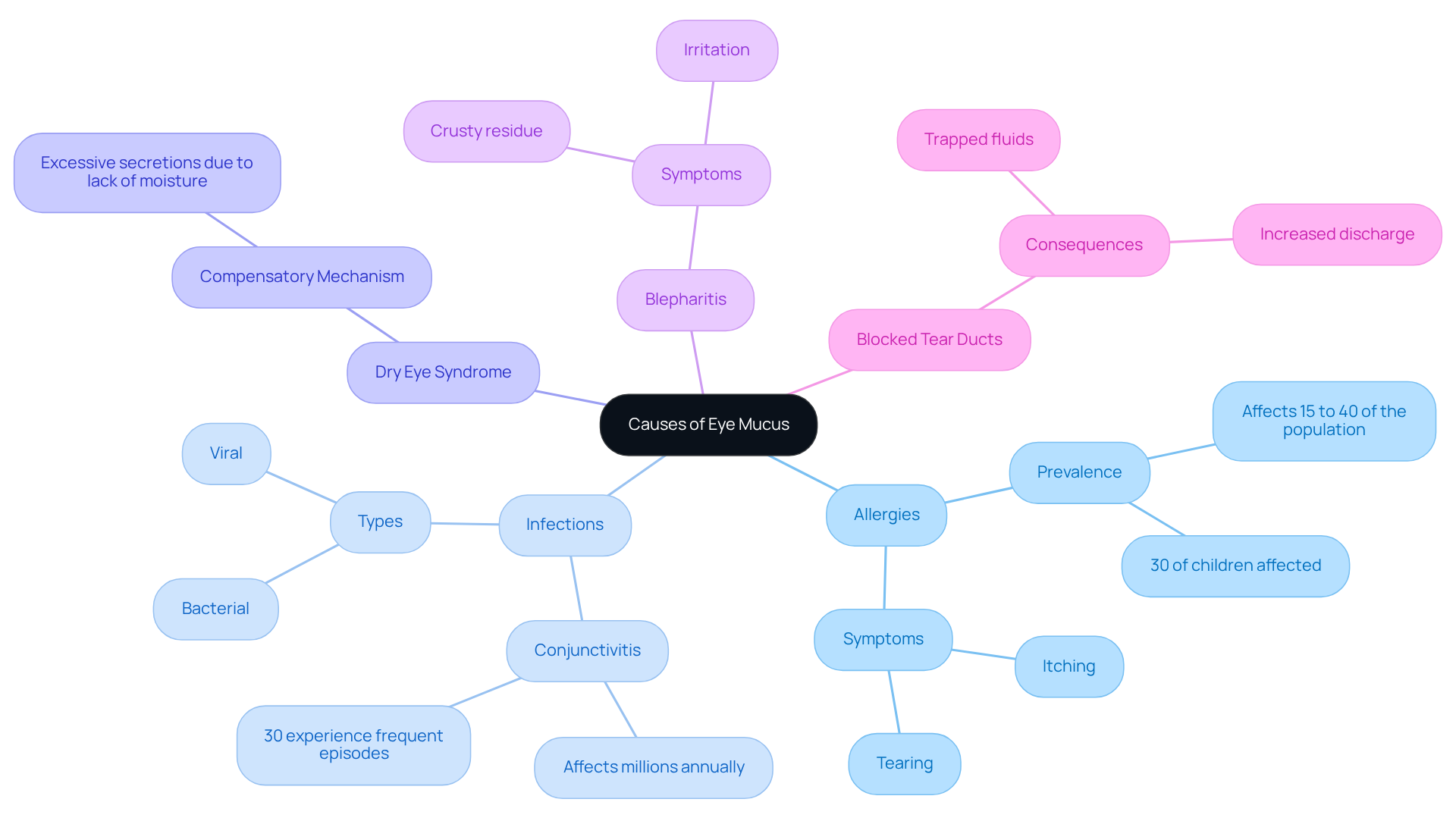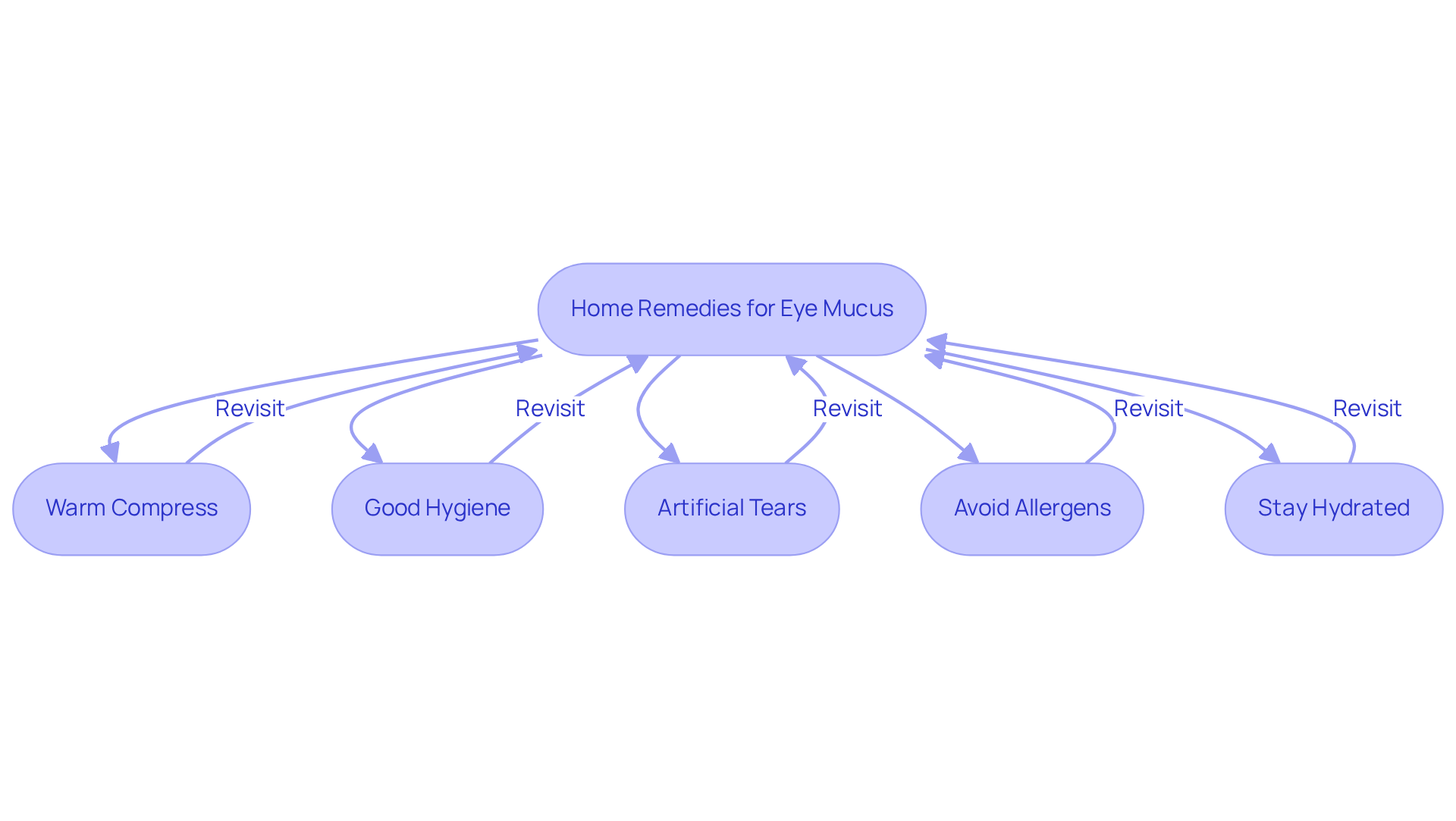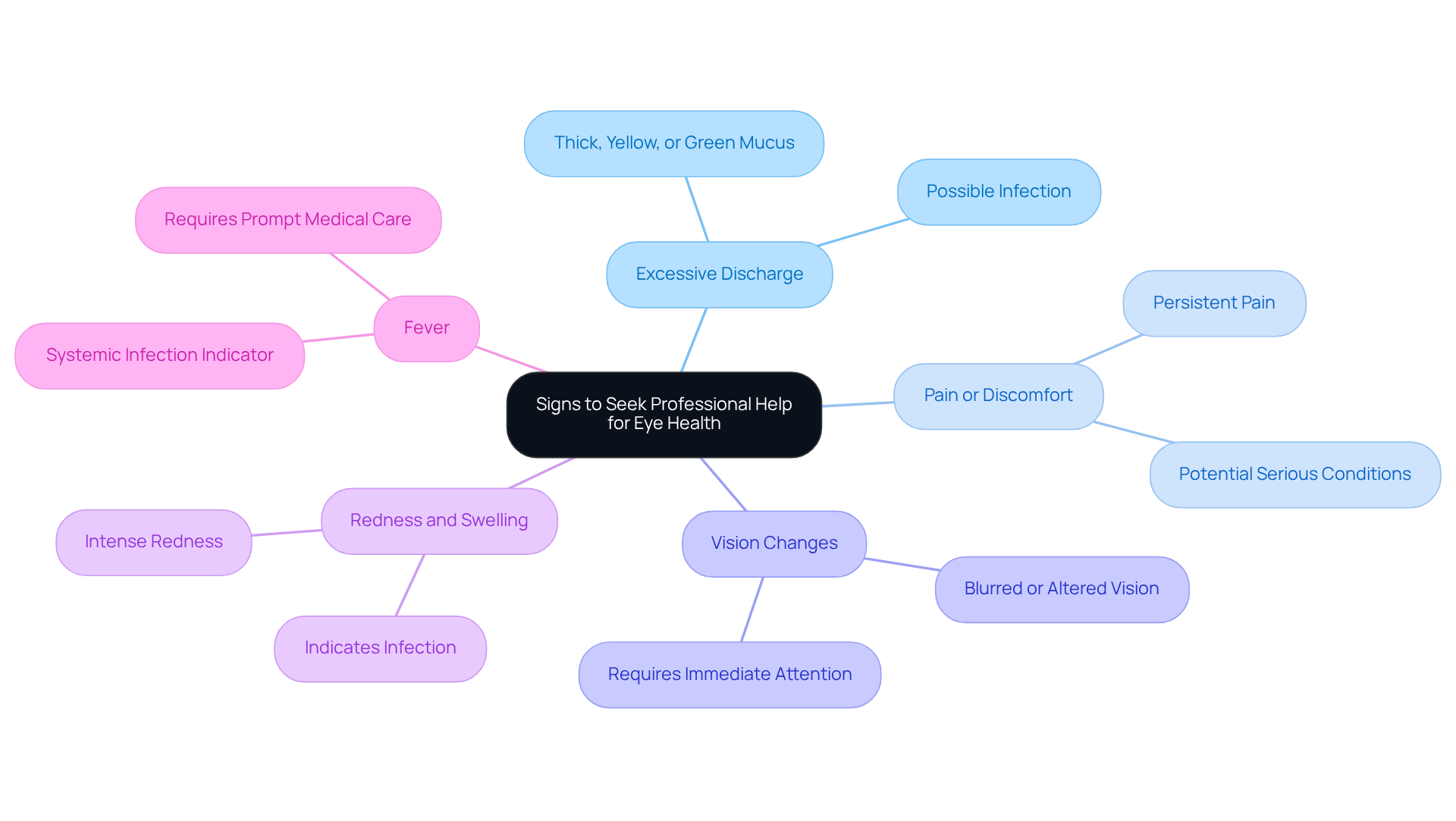Posted by: Northwest Eye in General on October 18, 2025
Overview
This article delves into the causes and remedies for mucus coming from the eye, recognizing that while some discharge is perfectly normal, excessive or abnormal mucus may signal underlying health concerns. We understand that noticing changes in your eye can be worrisome. Common causes include:
- Allergies
- Infections
- Dry eye syndrome
To offer reassurance, we provide practical home remedies and clear guidelines on when to seek professional help based on specific symptoms. Remember, you are not alone in this journey, and we are here to help you through it.
Introduction
Mucus in the eyes, often viewed as a minor annoyance, can actually provide important insights into your eye health. While a small amount of discharge is perfectly normal, excessive mucus may indicate underlying issues, ranging from allergies to infections. We understand that this can be concerning.
In this article, we will explore the causes of eye mucus, offering valuable insights into effective home remedies and guidance on when to seek professional help. It’s common to wonder what signs to look for to distinguish between harmless discharge and a potential health concern. Rest assured, we are here to help you through this process.
Define Eye Mucus: Nature and Commonality
Tears, often referred to as ‘sleep’ in the eyes, consist of a blend of fluid, oil, skin cells, and debris that collects in the corners of our eyes, especially during sleep. This natural secretion is vital for maintaining eye health, keeping our eyes moist, and protecting them from irritants. While a small amount of mucus coming out of the eye is typical, we understand that excessive or abnormal mucus coming out of the eye can be concerning and may indicate underlying health issues that require medical attention.
Recent research reveals that approximately 20% of infants are born with underdeveloped tear ducts, which can lead to increased eye secretion. It’s common for infants and young children to experience issues like conjunctivitis, which can result in mucus coming out of the eye. Ophthalmologists emphasize that while some discharge is normal, changes in color, consistency, or volume—especially when accompanied by redness or pain—should prompt a consultation with an eye care specialist.
Understanding the typical production of eye secretion and its implications is crucial. It helps us identify when symptoms may require further investigation or treatment. Remember, we are here to help you through this process, ensuring your eye health is prioritized and supported.

Identify Causes of Eye Mucus: From Allergies to Infections
Several factors can contribute to mucus coming out of the eye, and we understand that this can be concerning. Here are some common causes:
-
Allergies: Allergic reactions to pollen, dust, or pet dander can lead to increased mucus production as your body attempts to flush out irritants. It’s important to know that studies indicate allergic conjunctivitis affects 15% to 40% of the population, often exacerbated during peak allergy seasons.
-
Infections: Conditions such as conjunctivitis (pink eye) can cause symptoms like thick, colored discharge or mucus coming out of the eye, indicating a bacterial or viral infection. Conjunctivitis is a common eye condition that affects millions of people each year, and some forms can be highly contagious. A national survey revealed that 30% of patients experience frequent episodes of intense symptoms, highlighting the prevalence of this condition. We encourage proper infection control practices to prevent its spread.
-
Dry Eye Syndrome: Paradoxically, dry eyes can lead to excessive secretions as your eyes try to compensate for a lack of moisture.
-
Blepharitis: Inflammation of the eyelids can result in crusty residue and irritation, which can be bothersome.
-
Blocked Tear Ducts: This condition can trap fluids and lead to infection, causing increased discharge.
Recognizing these causes can help you determine the appropriate course of action for your symptoms. Eye care specialists emphasize the importance of a thorough evaluation to differentiate between these conditions. We are here to help you through this process and recommend effective management strategies to ensure your comfort and well-being.

Implement Remedies for Eye Mucus: Effective Home Solutions
To manage the discomfort caused by mucus coming out of eye effectively, we understand that it can be concerning. Here are some home remedies that may help you find relief:
- Warm Compress: Soak a clean cloth in warm water, wring it out, and gently place it over your closed eyes for 5-10 minutes. This can assist in loosening secretions and calming irritation, providing you with soothing comfort.
- Good Hygiene: Regularly clean your eyelids with a gentle cleanser or diluted baby shampoo to prevent mucus coming out of eye and remove crusty discharge. This simple step can make a significant difference in your eye health.
- Artificial Tears: Over-the-counter lubricating eye drops can help alleviate dryness and reduce mucus production. They are a quick and easy way to keep your eyes feeling fresh.
- Avoid Allergens: If allergies are a trigger, minimizing exposure to known allergens can significantly lessen discomfort. It’s common to feel overwhelmed by allergens, but taking these steps can help.
- Stay Hydrated: Drinking plenty of water helps maintain overall eye moisture and health. Remember, staying hydrated is key to your well-being.
These remedies can offer relief and enhance comfort, but if ongoing issues persist, we encourage you to consult with an eye care expert. We are here to help you through this process and ensure you receive the care you need.

Recognize When to Seek Professional Help: Signs and Symptoms
While some mucus coming out of the eye is normal, we understand that certain signs and symptoms can be concerning. It’s important to recognize when professional evaluation is needed:
- Excessive Discharge: If you notice a significant increase in mucus production, especially if it appears thick, yellow, or green, it may signal an infection. Ophthalmologists often find that such changes correlate with bacterial infections, which can escalate if left untreated.
- Pain or Discomfort: Persistent eye pain or discomfort that doesn’t improve with home remedies should be assessed by a professional. It’s common to feel anxious about eye pain, but research indicates that it can be a precursor to more serious conditions, necessitating prompt evaluation.
- Vision Changes: Blurred or altered vision that is accompanied by mucus coming out of eye is a serious concern that requires immediate attention. Data shows that these changes can be linked to underlying eye conditions, making timely intervention crucial.
- Redness and Swelling: Intense redness or swelling around the eyes can indicate an infection or other serious condition. These signs frequently occur with bacterial conjunctivitis, where symptoms such as mucus coming out of eye impact millions each year, and we want you to feel supported in addressing these symptoms.
- Fever: If you experience a fever alongside eye symptoms, this may suggest a systemic infection that needs prompt medical care. This combination of signs can indicate a more serious health concern that requires immediate attention.
Recognizing these symptoms can empower you to take timely action to protect your eye health. Remember, we are here to help you through this process.

Conclusion
Mucus coming out of the eye is a common occurrence, and we understand how concerning it can be. This condition is often linked to various underlying factors that can impact eye health. Understanding the nature of eye mucus, its causes, and appropriate remedies is essential for maintaining optimal eye care. While some discharge is normal, recognizing when it becomes excessive or abnormal is crucial for timely intervention.
Throughout the article, we’ve explored key causes such as:
- Allergies
- Infections
- Conditions like dry eye syndrome
- Blepharitis
Home remedies, including warm compresses and good hygiene practices, can offer effective relief for minor issues. However, it’s important to be vigilant for signs that indicate a need for professional evaluation, such as:
- Excessive discharge
- Pain
- Vision changes
- Fever
Ultimately, prioritizing eye health involves being informed about the symptoms and conditions associated with eye mucus. We encourage you to take proactive steps, such as consulting with eye care specialists when necessary, as this can lead to better outcomes. Ensuring awareness and understanding empowers you to seek help and maintain your eye health effectively. Remember, we are here to help you through this process.
Frequently Asked Questions
What is eye mucus and what does it consist of?
Eye mucus, often referred to as ‘sleep’ in the eyes, is a blend of fluid, oil, skin cells, and debris that collects in the corners of our eyes, especially during sleep.
Why is eye mucus important for eye health?
Eye mucus is vital for maintaining eye health as it keeps the eyes moist and protects them from irritants.
Is it normal to have some eye mucus?
Yes, a small amount of mucus coming out of the eye is typical and generally not a cause for concern.
When should I be concerned about eye mucus?
Excessive or abnormal mucus, especially when accompanied by changes in color, consistency, or volume, redness, or pain, should prompt a consultation with an eye care specialist.
Are there specific populations that may experience increased eye mucus?
Yes, approximately 20% of infants are born with underdeveloped tear ducts, which can lead to increased eye secretion. Infants and young children may also experience conditions like conjunctivitis that can result in mucus coming out of the eye.
What should I do if I notice changes in my eye mucus?
If you notice changes in the color, consistency, or volume of eye mucus, especially with accompanying symptoms like redness or pain, it is advisable to consult an eye care specialist for further investigation.






